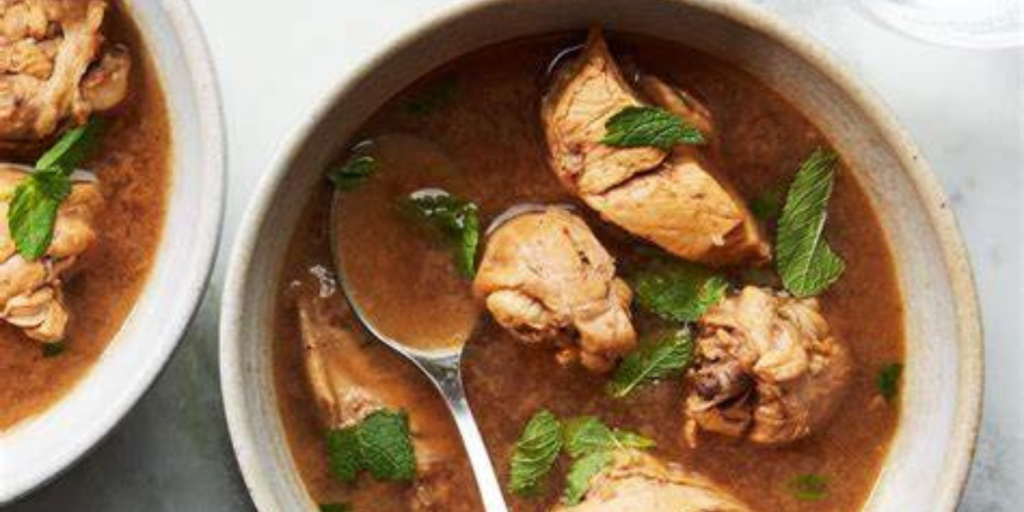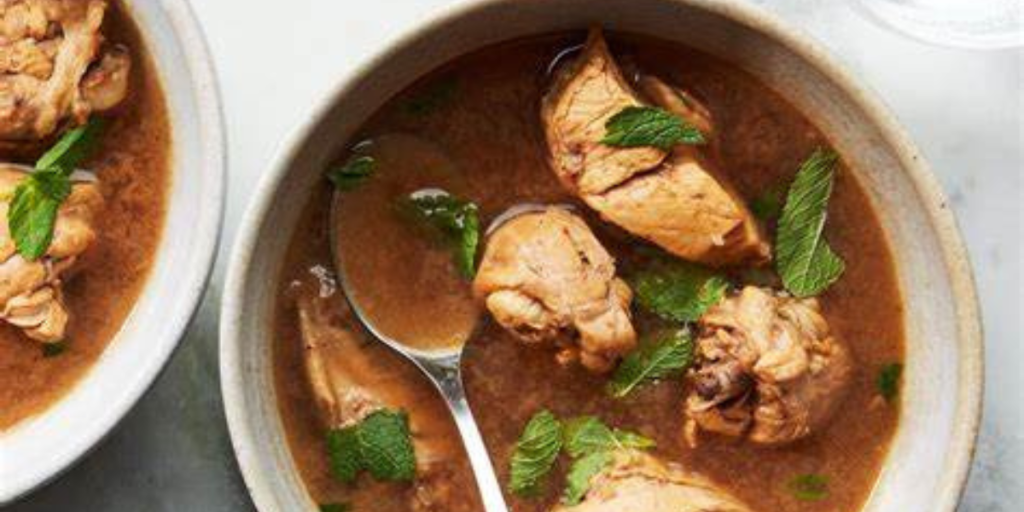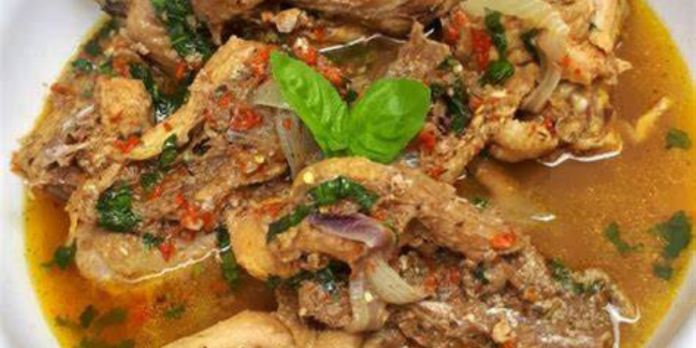Table of Contents
Nigerian Christmas Chicken stew. Christmas in Nigeria is a time of celebration, family gatherings, and, of course, food. One dish that is integral to the holiday feast is the famous Nigerian Christmas Chicken Stew. Known for its rich, vibrant flavors and tender chicken, this stew is not only a favorite among Nigerians but also a symbol of festivity and abundance.
This holiday chicken stew is packed with the perfect balance of spices, tomatoes, and savory seasonings, making it a memorable dish for any holiday gathering. Whether you’re preparing for Christmas or another special event, Nigerian festive chicken stew is guaranteed to impress your guests.
In this guide, we will walk you through the process of making the most delicious and flavorful Nigerian Chicken Stew. This recipe is designed to offer a step-by-step approach, making it easy for both beginners and seasoned cooks to prepare. Get ready to create a delightful stew that captures the heart of Nigerian Christmas celebrations.
How to Make Christmas Goat Meat Best 2024
The Origins of Nigerian Chicken Stew
Nigerian Chicken Stew, like many other Nigerian dishes, has roots in the diverse culinary traditions of the country. While Nigerian Christmas stew often features chicken, variations exist with other meats like goat or beef, depending on regional preferences. However, chicken stew remains the most popular option, especially for the festive season.
Chicken is the preferred protein for many Nigerians during the holidays due to its versatility and tenderness. Whether it’s served with rice, yam, or plantains, the richness of the chicken stew complements these side dishes perfectly, making it an essential part of the Nigerian holiday feast.
Why Nigerian Christmas Chicken Stew is a Must-Have for the Holidays

- A Rich Tradition of Flavor
Nigerian cuisine is known for its bold, rich flavors. The combination of fresh tomatoes, onions, and scotch bonnet peppers in a base for the stew ensures that the dish is full of depth. This stew features spices like thyme, curry, and bay leaves, which contribute to its layered flavor profile. - Perfect for Festive Gatherings
Nigerian Christmas Chicken Stew is a crowd-pleaser, whether you’re hosting a family gathering or attending a larger holiday event. The dish is easy to scale up, meaning it can feed a large number of people without losing its flavor. - Versatility
This stew can be paired with a variety of sides, including jollof rice, fried rice, boiled yam, or even bread. The richness of the stew enhances whatever dish it accompanies, making it a versatile addition to any holiday menu.
Ingredients for the Perfect Nigerian Christmas Chicken Stew
To make this chicken stew recipe, you’ll need to gather the following ingredients:
For the Stew:
- 1 whole chicken (about 2-3 kg), cut into parts (or use chicken thighs or drumsticks if you prefer)
- 6 large tomatoes, chopped
- 2 large onions, chopped
- 2 red bell peppers
- 5 scotch bonnet peppers (adjust based on your spice preference)
- 4 cloves of garlic, minced
- 2 tablespoons of ginger, grated
- 2 teaspoons of thyme
- 2 teaspoons of curry powder
- 1 teaspoon of ground white pepper
- 2 tablespoons of tomato paste
- 1/4 cup of vegetable oil (or palm oil for a richer flavor)
- 2 tablespoons of seasoning cubes or powder (adjust to taste)
- Salt, to taste
- 1 bay leaf
For the Chicken Marinade:
- 1 tablespoon of ground pepper
- 2 tablespoons of soy sauce
- 1 tablespoon of seasoning powder
- 1 teaspoon of thyme
- 1 teaspoon of curry powder
- 1 tablespoon of vegetable oil
Optional Garnishes:
- Fresh parsley or cilantro, chopped
- Fried plantains or dodo, for serving
Step-by-Step Guide to Making Nigerian Christmas Chicken Stew
1. Marinate the Chicken
Begin by marinating the chicken pieces. In a bowl, combine the ground pepper, soy sauce, seasoning powder, thyme, curry powder, and vegetable oil. Rub this mixture thoroughly on the chicken pieces, ensuring they are well-coated. Allow the chicken to marinate for at least 30 minutes, or even overnight for deeper flavor infusion.
2. Prepare the Tomato Sauce Base
To prepare the stew base, blend the tomatoes, onions, red bell peppers, and scotch bonnet peppers in a blender or food processor until smooth. For a chunkier stew, you can pulse the mixture a few times to leave some texture.
3. Cook the Chicken
Heat 2 tablespoons of vegetable oil in a large pot over medium heat. Add the marinated chicken pieces and sear them for about 5 minutes on each side until golden brown. Once browned, remove the chicken from the pot and set aside.
4. Prepare the Stew Base
In the same pot, add another 2 tablespoons of oil. Add the minced garlic and grated ginger and sauté for 2 minutes until fragrant. Then, pour in the blended tomato mixture. Stir well, ensuring the oil is well incorporated.
Add the curry powder, thyme, ground white pepper, and seasoning cubes to the tomato sauce. Allow the stew to simmer for about 15-20 minutes, stirring occasionally to prevent burning. The stew will thicken and reduce during this time.
5. Add the Chicken
Once the stew has reduced, add the seared chicken pieces back into the pot. Add the bay leaf and adjust the seasoning with salt to taste. Pour in a little water or chicken broth to ensure the chicken is partly submerged in the sauce.
Cover the pot and allow the chicken to cook in the sauce for another 30 minutes on low heat. This will allow the chicken to absorb all the wonderful flavors of the stew, making it incredibly tender and flavorful.
6. Final Touches
After the chicken has cooked through, remove the lid and check the stew’s consistency. If you prefer a thicker stew, allow it to simmer uncovered for an additional 10-15 minutes. If you prefer a more saucy stew, you can add a little water or chicken broth to reach your desired consistency.
Taste the stew and adjust for salt and seasoning if needed. You can garnish the stew with freshly chopped parsley or cilantro to add a fresh, herbal note.
How to Serve Nigerian Christmas Chicken Stew

The beauty of holiday chicken stew lies in its versatility. Here are some popular ways to serve it during the festive season:
- With Jollof Rice: This is the quintessential Nigerian pairing. The rich, savory chicken stew complements the smoky, spiced rice, creating the ultimate Christmas meal.
- With Fried Rice: Fried rice is another popular side that pairs well with this stew, bringing a wonderful crunch and flavor balance.
- With Boiled Yam or Plantains: For a more traditional touch, boiled yam or plantains serve as excellent sides. The sweetness of the plantains or yam provides a perfect contrast to the savory stew.
- With Bread: For a lighter meal, you can serve this stew with soft white bread or a hearty, crusty loaf.
Tips for Making the Best Nigerian Christmas Chicken Stew
- Use Fresh Ingredients: The fresher your tomatoes, onions, and peppers, the better your stew will taste. Fresh ingredients help the stew develop a fuller, richer flavor.
- Adjust the Spice Level: Scotch bonnet peppers are a signature ingredient in Nigerian cuisine, but they are also very spicy. If you prefer a milder stew, reduce the amount of scotch bonnet peppers or remove the seeds before blending.
- Use the Right Chicken: While you can use any part of the chicken, chicken thighs or drumsticks tend to be more flavorful and tender when cooked in stew. However, a whole chicken can be used for a more traditional experience.
- Simmer for Flavor: The longer the stew simmers, the richer the flavor becomes. Don’t rush the cooking process; let the stew cook on low heat for the best results.
- Make It Ahead: Nigerian Chicken Stew can be made ahead of time and stored in the fridge for up to 3 days. The flavors will continue to meld and deepen, making it even better the next day.
- Christmas Meat Pie Recipe: The Best 1 For the Season
Variations of Nigerian Chicken Stew
While the basic recipe for Nigerian Christmas Chicken Stew is loved across Nigeria, there are several variations that cater to different regional preferences, tastes, and dietary restrictions. Each variation brings its own unique flair to this festive dish, making it adaptable for all kinds of holiday celebrations.
1. Nigerian Chicken Stew with Palm Oil
One variation that many Nigerians enjoy, especially in the southwestern regions, is the palm oil-based chicken stew. Palm oil, with its distinct flavor and color, gives the stew a rich, deep red hue and a uniquely earthy flavor. To make this variation, simply substitute vegetable oil with red palm oil. The rich, nutty flavor of the palm oil enhances the stew and makes it even more decadent.
2. Nigerian Chicken Stew with Coconut Milk
For a creamy, slightly sweet twist, you can add coconut milk to the stew. This variation is especially popular in southern Nigeria, where coconut is abundant. Adding coconut milk creates a smoother, richer texture and a subtly sweet undertone that pairs beautifully with the spice and savory elements of the stew.
3. Nigerian Chicken Stew with More Vegetables
Incorporating more vegetables like carrots, bell peppers, or spinach can elevate your Nigerian festive chicken stew to new heights. The vegetables add natural sweetness and freshness, and they complement the chicken’s tenderness. Some variations also include green beans or peas, which contribute a satisfying crunch and color to the stew.
4. Spicy Nigerian Chicken Stew (Peppered Chicken Stew)
For lovers of heat, consider making a spicy Nigerian chicken stew by increasing the amount of scotch bonnet peppers or introducing extra chili peppers into the recipe. This will intensify the stew’s heat and flavor, making it perfect for those who enjoy their dishes with a punch of spice. The peppered chicken stew variation is a fan favorite during Nigerian Christmas celebrations, as it adds an extra layer of excitement to the meal.
Traditional Nigerian Christmas Chicken Recipes Best 1’s
Pairing Nigerian Christmas Chicken Stew with Drinks
To complete your holiday feast, you’ll want to pair your holiday chicken stew with the perfect drink. Here are a few drink suggestions that complement the flavors of Nigerian Chicken Stew:
1. Zobo (Hibiscus Drink)
A quintessential Nigerian drink, Zobo is a refreshing hibiscus tea that pairs perfectly with Nigerian chicken stew. The tanginess and slight sweetness of the Zobo help balance the richness and spice of the stew, making it a popular choice for many households during the Christmas season.
2. Chapman Cocktail
Another fantastic drink to serve with Nigerian festive chicken stew is Chapman, a vibrant and fruity Nigerian cocktail. Made with bitters, lemon, cucumber, and soda, it offers a refreshing, tangy contrast to the rich and hearty stew. This drink is often served at parties and celebrations, making it a perfect fit for your Christmas dinner table.
3. Palm Wine
For a more traditional pairing, palm wine is an ideal drink for Nigerian chicken stew. The smooth, slightly fermented taste of palm wine complements the spicy and savory flavors of the stew, making it a popular choice for large gatherings and festive meals.
4. Fresh Fruit Juices
For those who prefer non-alcoholic beverages, freshly squeezed fruit juices like pineapple, mango, or orange juice provide a sweet and refreshing option. These juices offer a natural sweetness that contrasts beautifully with the rich and savory flavors of the stew.
The Importance of Nigerian Christmas Chicken Stew in Nigerian Culture

Food is central to Nigerian culture, and no celebration is complete without a feast. Nigerian Chicken Stew, especially during Christmas, is more than just a dish—it is an expression of hospitality, joy, and togetherness. This stew brings families and friends together to share in the spirit of the holiday season.
In Nigerian culture, food is often used to symbolize abundance and blessings. The preparation of the Nigerian Christmas stew marks the coming together of loved ones to celebrate the joy of the season. It’s common to see families and communities gathering to cook, eat, and enjoy each other’s company over meals like this stew.
Serving Nigerian Chicken Stew is not only a way to nourish the body but also a way to honor traditions and create lasting memories. The dish is a celebration of the rich culinary heritage of Nigeria, bringing together indigenous spices, fresh ingredients, and cultural practices in a way that is uniquely Nigerian.
Perfect Nigerian Jollof Rice for Christmas Best for 2024
Making Nigerian Christmas Chicken Stew for Large Gatherings
When preparing holiday chicken stew for a large gathering or a festive celebration, there are a few tips that will help you scale up the recipe without compromising on flavor:
1. Cook in Batches
If you’re cooking for a crowd, consider making the stew in batches. This allows you to better control the cooking process, ensuring each batch is properly seasoned and cooked. Cooking in smaller portions will prevent overcrowding in the pot and ensure even cooking.
2. Use Larger Pots
For bigger gatherings, make sure to use large stock pots or Dutch ovens to accommodate the increased volume of ingredients. A larger pot also allows the stew to simmer evenly, which is crucial for extracting all the rich flavors.
3. Double or Triple the Recipe
Doubling or tripling the recipe is the simplest way to ensure there is enough stew for everyone. Be sure to adjust the cooking time slightly, especially during the simmering phase, to account for the increased quantity. Keep an eye on the stew as it cooks to ensure the flavors are balanced and nothing is overcooked.
4. Prep Ingredients in Advance
To save time on the day of the event, prep your ingredients the night before. Wash, chop, and marinate the chicken in advance. You can also blend the tomatoes and peppers beforehand and store them in the fridge. This allows you to focus on cooking the stew itself when you’re ready to start.
Alternative Ingredients and Substitutions for Nigerian Christmas Chicken Stew
While the traditional Nigerian Christmas Chicken Stew recipe uses specific ingredients, there are several substitutions you can make based on availability, dietary preferences, or personal taste. These alternatives allow you to customize the stew while keeping the essential flavors intact.
1. Vegetable Oil vs. Palm Oil
As mentioned earlier, you can make this stew using palm oil for a richer, more authentic taste. However, if you’re not fond of the strong flavor of palm oil or want a lighter version, you can easily substitute it with vegetable oil or olive oil. The difference in taste will be subtle, but vegetable oil provides a neutral base that allows the stew’s spices and seasonings to shine.
2. Soy Sauce vs. Maggi Seasoning
While Maggi seasoning cubes are a staple in Nigerian cooking, you can opt for soy sauce if you prefer a different umami flavor or if you need a gluten-free alternative. Soy sauce provides a salty and savory depth that complements the stew well, though it is slightly less potent than the traditional seasoning cubes.
3. Boneless Chicken vs. Bone-In Chicken
For a quicker version of the stew, you can use boneless chicken (like chicken breast or thighs). These cuts cook faster and are easier to serve, especially when you’re feeding a large group. However, bone-in chicken offers a more flavorful broth and a more traditional feel to the dish. The choice between boneless and bone-in depends on your preference for convenience versus the rich, flavorful broth that bones provide.
4. Tomato Paste vs. Fresh Tomatoes
Using tomato paste enhances the stew’s rich red color and adds a concentrated tomato flavor. If fresh tomatoes are unavailable or if you want a deeper tomato taste, tomato paste is a great alternative. However, fresh tomatoes create a more balanced and slightly tangy stew. For the most authentic taste, a blend of both fresh tomatoes and tomato paste is ideal.
5. Scotch Bonnet Pepper vs. Habanero or Thai Chili
If scotch bonnet peppers are hard to find, you can substitute them with other hot chili peppers, such as habanero peppers or Thai chili peppers. These peppers offer a similar level of heat and a comparable flavor profile, ensuring your stew retains its signature spiciness. You can also use bell peppers if you prefer a milder stew.
How to Store and Reheat Nigerian Christmas Chicken Stew

Once you’ve made your Nigerian festive chicken stew, you might have leftovers, especially if you’re cooking for a large group. Proper storage and reheating methods are essential to maintaining the stew’s flavor and texture.
Storing the Stew
- Allow the stew to cool completely before transferring it to an airtight container. This helps prevent the growth of bacteria and keeps the stew fresh.
- Refrigerate the stew for up to 3 days. The flavors will continue to deepen as it sits in the fridge, making it even better the next day.
- For longer storage, you can freeze the stew. Portion it into smaller containers and freeze for up to 3 months. When you’re ready to enjoy it, thaw it in the fridge overnight or heat it gently on the stove.
Reheating the Stew
- To reheat the stew, place it in a pot over low to medium heat, stirring occasionally to ensure it doesn’t stick to the bottom. Add a little water or chicken broth if the stew has thickened too much in the fridge.
- Alternatively, you can reheat the stew in a microwave-safe container. Heat in 1-2 minute intervals, stirring between each interval until it is thoroughly heated.
Tips for Freezing Nigerian Chicken Stew
- To preserve the stew’s flavor and texture, freeze it without the chicken for best results. Add freshly cooked chicken when reheating if you want it to stay tender.
- Avoid freezing the stew if you’ve added vegetables like spinach or other leafy greens, as they may become soggy upon thawing.
Frequently Asked Questions (FAQs) About Nigerian Christmas Chicken Stew
To provide even more value for your readers and make your article more comprehensive, let’s address some common questions people have when making Nigerian Christmas chicken stew.
1. Can I use chicken breasts for this stew?
Yes! You can use chicken breasts for a leaner stew. However, chicken breasts cook faster and may be drier than thigh pieces or drumsticks. For a more flavorful and tender stew, it’s best to use bone-in pieces such as chicken thighs or drumsticks, but boneless options are a good choice for a quicker cook time.
2. What is the difference between Nigerian chicken stew and regular chicken stew?
Nigerian chicken stew is distinctive because of its bold use of spices, particularly scotch bonnet peppers, thyme, and curry powder, which give it a unique flavor profile. The addition of tomatoes, onions, and seasoning cubes creates a rich, savory base. Compared to a regular chicken stew, which may be milder and less spicy, Nigerian chicken stew tends to be more aromatic and complex in flavor, often served with starchy sides like rice, yam, or plantains.
3. Can I make Nigerian Chicken Stew without the peppers?
While scotch bonnet peppers are an essential part of Nigerian Chicken Stew, you can reduce or omit them if you’re sensitive to spice. If you want to preserve some heat without the intense spiciness of scotch bonnet peppers, try using bell peppers or jalapeños. However, removing the peppers will alter the signature flavor and intensity of the stew, so consider adding other ingredients like ginger, garlic, and spices to keep the flavor vibrant.
4. Is Nigerian Chicken Stew spicy?
Yes, Nigerian Chicken Stew is traditionally quite spicy due to the inclusion of scotch bonnet peppers. However, the level of spice can be adjusted to suit your preferences. If you’re cooking for a crowd with varying spice tolerances, you can control the amount of scotch bonnet or use milder peppers to reduce the heat. The stew will still maintain its bold flavor without being overwhelmingly spicy.
5. Can I add other meats to the stew?
Yes, you can experiment by adding other meats like goat meat, beef, or fish to the stew. While chicken is the traditional choice for Nigerian Christmas stew, variations with other meats are common, especially in regions where these proteins are more popular. Be sure to adjust the cooking time for tougher meats like goat or beef to ensure they become tender.
6. What are some side dishes to serve with Nigerian Chicken Stew?
Nigerian Chicken Stew pairs well with various traditional side dishes, such as:
- Jollof Rice: A classic Nigerian side dish made with rice, tomatoes, and spices.
- Fried Rice: Another popular rice dish that pairs well with the rich stew.
- Boiled Yam or Plantains: A starchy and sweet side that balances the savory flavors of the stew.
- Pounded Yam or Fufu: These Nigerian staples are perfect for dipping into the thick, flavorful stew.
- Moi Moi: A steamed bean pudding that adds texture and flavor to the meal.
Final Reflections: Why Nigerian Christmas Chicken Stew is a Staple for the Holidays
When you think about the holidays, certain dishes bring to mind the warmth of family gatherings, the joy of celebration, and the comfort of shared meals. Nigerian Christmas Chicken Stew is one such dish that encapsulates the essence of Nigerian culture and tradition. With its vibrant flavors, tender chicken, and savory sauce, it is the perfect dish to bring people together during the festive season.
Whether you’re cooking for a small family gathering or a large party, this stew is a recipe that can be adapted and scaled to fit your needs. From its rich history to its current place as a beloved holiday dish, Nigerian Chicken Stew has stood the test of time, continually delighting both Nigerians and non-Nigerians alike.
By following the detailed recipe and tips provided in this article, you’ll be well on your way to making the best Nigerian Christmas Chicken Stew ever. This stew is more than just a meal; it’s an experience—one that reflects the spirit of the holiday season, the richness of Nigerian culture, and the joy of sharing food with loved ones.





















